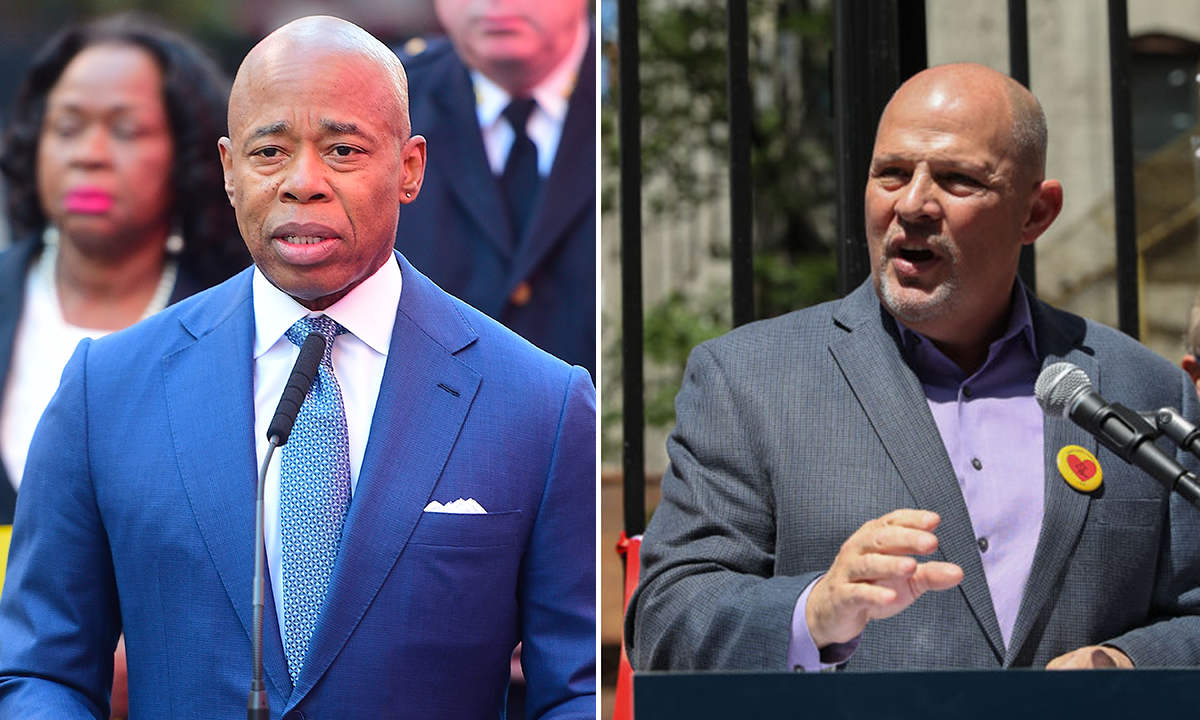Why Is New York City Paying Teachers Union Members $3,000 to Accept a 20% Raise?
Teachers will also receive a $400 retention bonus. But many will already be making six-figure salaries during the term of the $6.4 billion contract.

Get stories like this delivered straight to your inbox. Sign up for The 74 Newsletter
Negotiators for New York City and the United Federation of Teachers reached a tentative agreement on a five-year contract last week. Teachers will receive a cumulative raise of about 20%, plus additional bonuses.
Union President Michael Mulgrew, Mayor Eric Adams and other city officials took turns thanking and congratulating each other on the “historic” deal during the press announcement.
“As I indicated over and over again and never let you forget, I’m probably one of the few modern-day mayors that was a member of a union,” said Adams.
The union’s bargaining committee, executive board and delegate assembly each voted in turn to send the contract to the full membership for approval. This process didn’t go smoothly, as the final agreement wasn’t ready for union representatives to read before their vote. Union leaders wanted a vote before summer vacation.
“You don’t buy a house based on a PowerPoint the realtor showed you, or a used car based on the PowerPoint your used car salesman showed you,” said one executive board member. “We need to know what’s in this contract before we vote on it.”
The New York City teachers contract is 238 pages long, and the memorandum of agreement just negotiated is another 38 pages by itself. Familiarity with all of its provisions — never mind understanding of them — falls to the union’s staff and its most committed activists. Most rank-and-file members will skip to the bottom line to decide whether to approve the contract. The amount of the raises would not surprise them, for better or worse, because the city and its unions practice pattern bargaining.
That is a process by which a contract reached with one union becomes the model for all others. When District Council 37, which represents 150,000 municipal workers, agreed to a five-year deal in February with annual raises of 3%, the pattern meant the UFT would not get much more than that.
There had been griping among some teachers because the initial raise doesn’t match the 2023 inflation rate. So the city added a couple of sweeteners in the form of bonuses.
The first has received a lot of press attention. At the end of the 2023-24 school year, every teacher will receive a $400 retention bonus for staying on the job. This will go up each year until reaching $1,035 by the end of 2027, and increase thereafter by the percentage of salary-schedule raises negotiated into subsequent contracts.
While all additional money is welcome, many teachers will already be making six-figure salaries during the term of the contract, so a few hundred dollars isn’t going to send them into paroxysms of delight. But the second, less publicized, bonus will have a significant effect.
Every UFT member will receive $3,000 immediately upon ratifying the contract.
Why pay union members a $3,000 bonus to accept a 20% raise?
This defies any sort of fiscal logic. The city is spending $350 million to induce union members to ratify a $6.4 billion contract they are in no position to reject. And New York’s Taylor Law is one the strictest anti-strike laws in the nation.
Adams did include a $3,000 ratification bonus for members of District Council 37, which represents 150,000 municipal workers, but that made a little more sense as an inducement because the contract was setting the pattern. When DC 37 members ratified it, it ensured that 3% raises would be the ceiling for all other municipal unions.
Perhaps the teachers union insisted on a ratification bonus because DC 37 got one and it could get no more in salary schedule raises. But it also made political sense for Adams, who will have largely achieved labor peace extending beyond the end of his first term, which runs through 2026.
The reason for the union’s haste to vote is harder to determine. Balloting will take place at school sites June 27, but the new contract doesn’t go into effect until September, so it could have conceivably waited until then.
The UFT internal opposition caucus New Action, along with activists Norm Scott and Arthur Goldstein, are urging “no” votes on their blogs. The city’s tabloid press isn’t too enamored of the agreement either. The New York Daily News editorial board called it “costly,” while the New York Post cited an estimate by the Citizens Budget Commission that the city will have an $11 billion budget gap by the end of the contract. But resistance is futile. With no guarantee that sending negotiators back to the table would result in an appreciably improved deal, teachers will happily take their $3,000 and enjoy their summer.
Still, the contract does not address one highly contentious issue: retiree health care. No changes were made to current policy, but the move to place many union members into Medicare Advantage plans is still the subject of litigation. UFT headquarters may be the target of more labor unrest than the mayor’s office will in the coming years.
Mike Antonucci’s Union Report appears most Wednesdays; see the full archive.
Get stories like these delivered straight to your inbox. Sign up for The 74 Newsletter

;)